Nonviolence

I love Martin Luther King. I wrote my master’s thesis on his approach to nonviolence. King is the greatest prophet in the history of the United States. And white people should know him better.
Blitzer, like so many white people, doesn’t know Martin Luther King. He misses King’s point. If white people want to reference King, we need to stop using him to condemn black violence. We need to stop pitting a black man against black people. It’s patronizing. It’s demeaning. And it misses the point.

I walked through ash and glass as neighbors and community members swept up the remnants of our neighborhood. The night before, flames touched sky in all corners of our city as news and police helicopters hovered overhead. The city was Los Angeles. The year was 1992, and it was the third day after the police who beat Rodney King were acquitted by an overwhelmingly white jury in Simi Valley.
That was the day I was introduced to the words of Jeremiah 29:7: “But seek the peace of the city where I have sent you into exile, and pray to the Lord on its behalf, for in its peace you will find your peace.”
On Monday, Maryland Gov. Larry Hogan called in the National Guard and Baltimore Mayor Stephanie Rawlings-Blake declared a citywide curfew to quell violence that erupted in Monument City following the funeral of 25-year-old Freddie Gray. Gray died a week after sustaining a nearly severed spinal cord after being detained by police on April 12. The reason for the stop? Gray ran after making eye contact with police. An investigation is ongoing — while the people of Baltimore and beyond demand justice.
The images of fires rising over the Baltimore landscape were eerie, as it was only a few months ago that the nation sat glued to television sets watching the small town of Ferguson, Mo., erupt. And I fear we are becoming numb to it. We turn the TV on to watch our favorite reality show. We see chanting, running black people, and we think: again? Then we turn back to The Voice.
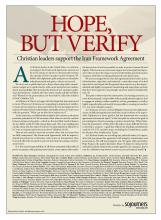
This week, more than 50 Christian leaders came together to voice our support for the framework of a Joint Comprehensive Plan of Action between Iran and the P5+1 nations (the United States, the United Kingdom, France, Russia, China, and Germany), concerning Iran’s nuclear program. Sojourners published the leaders’ statement as a full-page ad in Roll Call, a Washington, D.C., political newspaper widely read by members of Congress and their staff.
The statement, signed by leaders from all the major streams of American Christianity — Roman Catholic, evangelical, mainline Protestant, Orthodox, and Pentecostal — is reprinted below. We want to share this letter with you, the Sojourners community, and the broader public. I urge you to prayerfully consider adding your own voice in support of the diplomatic process and share the opportunity with others. Read it, discuss it in your churches, and add your name. This is a historic opportunity for diplomacy to triumph over armed conflict, and as people of faith, you can play an important role in helping the process succeed.
—Jim Wallis, Founder and President, Sojourners

A Good Neighbor
Children’s television host (and Presbyterian minister) Fred Rogers was known for his gentle, soft-spoken manner. Michael G. Long argues in Peaceful Neighbor: Discovering the Countercultural Mister Rogers that Rogers was also a radical, imbuing his show with nonviolence and care for creation. Westminster John Knox Press
The destruction and looting of art and historical sites in Syria is "the worst cultural disaster since the Second World War,” according to anthropologist Brian L. Daniels.
The human losses are devastating: At least 210,000 people have died in the ongoing battle between the Assad regime and the Syrian rebels. ISIS has joined the violence and exploited the instability in the country, taking control of large parts of northern and eastern Syria.
And now, in the unofficial war over Syria’s cultural heritage, art is the main casualty. As of September 2014, five out of six of Syria’s Word Heritage sites had been destroyed including Aleppo’s 12th century Umayyad mosque.
ISIS’ ruthless participation in the Syrian conflict only increases the danger to Syrian art and history: In ISIS controlled Mosul, Iraq, art, music, and history have been removed from school curriculum. In February, ISIS released a video of its fighters smashing ancient statues and artifacts in the Mosul museum in an effort to weed out “heresy,” prompting the UNESCO Director-General to call for an emergency meeting with the Security Council to advocate for the “protection of Iraq’s cultural heritage as an integral element for the country’s security.”

SOME OF THE WORLD’S oldest spiritual music has been recorded, and thus preserved—just in time—thanks to a punk-rock drummer/photographer.
The ancient city of Aleppo, Syria, is a UNESCO World Heritage Site and considered one of the oldest continuously inhabited cities in the world. Since 2012, when the Syrian civil war moved in to the area, Aleppo has been ravaged by fighting, and many of its inhabitants killed or made refugees.
Several years before the war began, Jason Hamacher embarked on an accidental odyssey to capture the sights and sounds of Aleppo, not knowing he might be the last to do so before the Old City, the historic city center, was destroyed.
Hamacher moved to Washington, D.C., in his teens and spent his high school years exploring a dual identity that would stick: Christian and son of a Southern Baptist preacher, and drummer in D.C.’s vibrant hardcore punk scene. Since 1993, he has recorded and toured with Frodus, Decahedron, Battery, and Regents. When he found himself between bands in 2005, he and some fellow musician friends who were also Christian vowed to search for new sounds in old spiritual music.
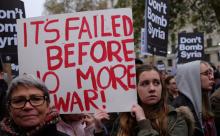
THE PEACE MOVEMENT needs a stronger response to the threat posed by the Islamic State in Iraq and Syria. It is not enough merely to oppose deepening U.S. military involvement. We must also identify viable diplomatic and political options for countering the ISIS danger and reducing violence in the region.
President Obama has said there is no military solution to the crisis in Iraq, but his administration has relied heavily on bombing as its main response to ISIS. Since August, the United States and about a dozen other states have launched more than 1,900 air strikes against ISIS and militant groups in Iraq and Syria. Approximately 80 percent of the strikes have been conducted by U.S. forces, mostly jet fighters but also armed drones. The strikes have had the effect of halting further ISIS encroachments into Iraq and have enabled Kurdish fighters to regain some ground in the northern part of Iraq. In Syria, however, ISIS reportedly has continued to gain ground despite the U.S.-led attacks.
U.S. military involvement in Iraq and Syria is having unintended effects that could make matters worse. Battling the United States gives ISIS a transcendent objective beyond its political agenda in Iraq and Syria and distracts local attention from its brutal policies. It allows ISIS to portray itself as the victim and to claim that it is defending Islam from Western attack. After the start of airstrikes in August, support for the group increased. The strikes in Syria have also targeted the al Nusra Front and have generated pressure for rival groups to close ranks. Unlike al Qaeda, ISIS has not declared war on the United States, but it may now rethink its strategic focus and plan attacks on the “far enemy,” to use al Qaeda’s term.
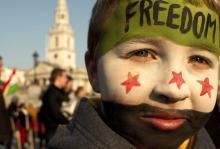
IN JULY 2013 in Raqqa, the first city liberated from regime control in northeastern Syria, a Muslim schoolteacher named Soaad Nofal marched daily to ISIS headquarters. She carried a cardboard sign with messages challenging the behaviors of members of the Islamic State of Iraq and Syria as un-Islamic after the kidnapping of nonviolent activists. After Nofal was joined by hundreds of other protesters, a small number of activists were released. It is a small achievement, but an indication of what communities supported in responsible ways from the outside could achieve on a larger scale in areas controlled or threatened by ISIS.
In the fight against ISIS, unarmed civilians would seem to be powerless. How can collective nonviolent action stand a chance against a heavily armed, well-financed, and highly organized extremist group that engages in public beheadings, kidnappings, and forced recruitment of child soldiers and sex slaves? One whose ideology sanctions the killing of “infidels” and the creation of a caliphate?
A couple of folks I really respect – Kate Gould of Friends Committee on National Legislation (aka, the Quaker Lobby), and Jim Wallis of Sojourners – were recently on the O’Reilly Factor. For those of you who don’t watch cable news, this is a television program where Bill O’Reilly basically screams at people and incites hatred of anything non-white, non-rich, and non-Republican. I normally don’t watch the show. But when I heard that Kate and Jim were going to be talking, I tuned in.
I knew almost immediately this wasn’t going to be good. It’s Bill’s program, so he gets to frame the question. Here’s what he asks: Do Christian pacifists have a solution for stopping ISIS?
It’s the wrong question.


With the unimaginable evils being committed by ISIS and other terror groups around the world, many Christians are calling for their violent destruction — some even voluntarily taking up arms.
At first glance this may seem like a heroic, brave, and honorable act, but before we start killing our enemies, Christians must ask themselves four very important questions:
1. Did Jesus clearly tell you to kill these people?
In the New Testament, Jesus repeatedly instructs his followers to avoid violence and promote peace.
Jesus states things like:
Blessed are the peacemakers, for they shall be called sons of God. (Matt. 5:9 ESV)
And …
You have heard that it was said, ‘An eye for an eye and a tooth for a tooth.’ But I say to you, Do not resist the one who is evil. But if anyone slaps you on the right cheek, turn to him the other also. (Matt. 5:38-39)
And …
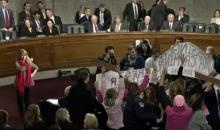
After a week here in FMC Lexington Satellite camp, a federal prison in Kentucky, I started catching up on national and international news via back issues of USA Today available in the prison library. An "In Brief" item, on p. 2A of the Jan. 30 weekend edition, caught my eye. It briefly described a protest in Washington, D.C., in which members of the antiwar group "Code Pink" interrupted a U.S. Senate Armed Services budget hearing chaired by Sen. John McCain (R-Ariz.). The protesters approached a witness table where Henry Kissinger, Madeleine Albright, and George Schulz were seated. One of their signs called Henry Kissinger a war criminal. "McCain," the article continued, "blurted out, 'Get out of here, you low-life scum.'"
At mail call, a week ago, I received Richard Clarke's novel, The Sting of the Drone, about characters involved in developing and launching drone attacks. I'm in prison for protesting drone warfare, so a kind friend ordered it for me. The author, a former "National Coordinator for Security and Counterterrorism," worked for 30 years inside the U.S. government but seems to have greater respect than some within government for concerned people outside of it. He seems also to feel some respect for people outside our borders.
He develops, I think, a fair-minded approach toward evaluating drone warfare given his acceptance that wars and assassinations are sometimes necessary. (I don't share that premise). Several characters in the novel, including members of a House Permanent Select Committee on Intelligence, criticize drone warfare, noting that in spite of high level, expensive reconnaissance, drone attacks still kill civilians, alienating people the U.S. ostensibly wants to turn away from terrorism.

I WALKED THROUGH the halls of the Rosa Parks Museum in Montgomery, Ala.—slowly. Original documents lined the walls of the nation’s central memorial to the local actions that helped trigger the national mass movement for civil rights. To skim would have been a sacrilege. Each document was evidence. Evidence of struggle. Evidence that America’s apartheid happened. Evidence of a miracle.
The museum is like a labyrinth. Each room builds on the last, adding color and depth to a reality most of the nation has only experienced in the two-dimensional contours of sepia-toned documentary footage and pictures.
I entered the room with the kitchen table where Martin Luther King Jr. dropped to his knees and prayed, weeping, scared, and still holding onto the last vestiges of his personal dream for a middle-class preacher’s life. For my tour group, the room was about that table, but the documents lining the walls like wallpaper caught my eye.
One stood out. It was a full-page newspaper ad with a letter from the White Citizens’ Council of Montgomery to the blacks of Montgomery. The letter pleaded with the black citizens to “stop their violent attack on their city.”
The first time I read “Stop this violence,” I was befuddled. What violence?
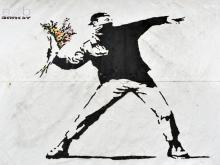
What good would it do for three kayaks, three canoes, and a rubber dinghy to paddle into the path of a Pakistani steamship? For a tiny fishing boat with unarmed, praying Americans aboard to sail toward an American battleship threatening Nicaragua? For an 80-year-old lady in a wheelchair to stop in front of advancing Filipino tanks? Or for nonviolent protesters to defy the communist rulers of the Soviet Empire?
Soviet communism collapsed. The tanks stopped and a nonviolent revolution succeeded. The American battleship left and the threat of invasion faded. And the U.S. shipment of arms to Pakistan stopped.
Those are just a few of the many dramatic successes of nonviolent confrontation in the last several decades. Everyone, of course, knows how Mahatma Gandhi’s nonviolent revolution eventually defeated the British Empire and – as the powerful film Selma now reminds us – Martin Luther King Jr.’s peaceful civil rights crusade changed American history. There have been scores upon scores of instances of nonviolent victories over dictatorship and oppression in the last 50-plus years. In fact, Dr. Gene Sharp, the foremost scholar of nonviolence today, has said that the later 20th century saw a remarkable expansion of the substitution of nonviolent struggle for violence. More recent scholarship has not only confirmed Sharp’s comment; it has also shown that nonviolent revolutions against injustice and dictatorship are actually more successful than violent campaigns.
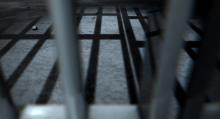
The Bureau of Prisons contacted me today, assigning me a prison number and a new address: for the next 90 days, beginning tomorrow, I’ll live at FMC Lexington, in the satellite prison camp for women, adjacent to Lexington’s federal medical center for men. Very early tomorrow morning, Buddy Bell, Cassandra Dixon, and Paco and Silver, two house guests whom we first met in protests on South Korea’s Jeju Island, will travel with me to Kentucky and deliver me to the satellite women’s prison outside the Federal Medical Center for men.
In December 2014, Judge Matt Whitworth sentenced me to three months in federal prison after Georgia Walker and I had attempted to deliver a loaf of bread and a letter to the commander of Whiteman Air Force base, asking him to stop his troops from piloting lethal drone flights over Afghanistan from within the base. Judge Whitworth allowed me more than a month to surrender myself to prison; but whether you are a soldier or a civilian, a target or an unlucky bystander, you can’t surrender to a drone.
When I was imprisoned at Lexington prison in 1988, after a federal magistrate in Missouri sentenced me to one year for planting corn on nuclear missile silo sites, other women prisoners playfully nicknamed me “Missiles.” One of my sisters reliably made me laugh today, texting me to ask if I thought the women this time would call me “Drones.”
It’s good to laugh and feel camaraderie before heading into prison. For someone like me, very nearly saturated in “white privilege” through much of this arrest, trial, and sentencing process, 90 percent (or more) of my experience will likely depend on attitude.

The world is swirling with issues.
Picking up my phone and opening my news app each morning is being met with more and more dread each day.
When something hits the news, it is fascinating to watch people jump onto social media and begin “yelling" out their answers for how to heal our broken systems.
Of course, there are almost always at least two completely different opinions for how these problems should be fixed, which typically leads to people drawing lines in the sand, picking their stance, and not budging. Relationships often fracture and a polarized a world gets more polarized, rendering it immobilized for the work of reconciliation.
Whether it’s on our Facebook page, Twitter feed, or around our table, I assume most of us can think of an interaction where this unhelpful and potentially destructive reality played out.
So, does this “yelling” of our opinions actually help heal the broken systems and the people whom those systems are breaking?
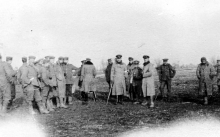
One hundred years ago, during the First World War, the Christmas truce took place between British, German, and French soldiers in the trenches on the Western Front. On Christmas Eve 1914, soldiers from opposing sides, who were stationed there to kill each other, instead got to know one another, shared photos of loved ones, and even had a game of soccer.
This of course made their superiors furious, not just because the troops were disobeying orders, but because it is much harder to harm someone with whom you have formed some sort of relationship. The enemy is to be faceless and nameless.
The same holds true for millions of people living in poverty around the world this Christmas. They are the faceless and nameless ones. In reality though, the enemy that is poverty is not faceless. Poverty is about people; it is not about statistics. Poverty is also not just about a lack of material goods; it is more about a lack of dignity, a lack of a sense that you are important. We are reminded that poverty is always personal because it is about relationship.

Does the Bible describe a God of love or a God of genocide? How are we to reconcile that the apparent answer to this question is that it describes both? As people of faith, we need to face the sobering fact that some parts of our Bible command us to love our enemies, while other parts command mercilessly slaughtering them. If the Bible is God's Word, how can it present such starkly contrasting visions of who God is, and what faithfulness to God entails?
The typical response among conservative Christians is to seek to justify violence as good in an attempt to defend the Bible. This tendency to defend violence becomes especially relevant in the wake of the Senate report on the CIA's use of torture. While the report was met with shock and outrage in some quarters, it was also defended by a good number of conservative Evangelical Christians. In fact, a 2009 Pew Research poll found that 6-in-10 white Evangelicals support the government's use of torture.
Politicians defend torture in the name of "justice" and "defense," while conservative Christians speak in the more religious language of "God's will," citing biblical texts for support. In the end, however, the same point is being made. Whether it is described in the vocabulary of religion or more "secular" terms, violence — and in the case of torture, shockingly inhumane violence — is described as a necessary means for bringing about the good. This logic is at the heart of all religious violence, and it is a view that is alive and well today.
On the other hand, the typical liberal Christian response to the violence in the Bible is to act as if it were not there. One speaks of Christianity as a "religion of love," and points to the many parts of the Bible that speak of caring for the poor and the stranger.

I believe in love. I don’t subscribe to any particular religion.
Feroz, a Hazara who is a Shia Muslim, lived with me in a community in Kabul with 13 other Afghan Peace Volunteers, including Tajiks and Pashtuns, who are Sunnis.
This is a community established with the intention of learning about and practicing nonviolence, a little like an Afghan version of Gandhi’s ashram.
One day, there were black faces and a curt exchange of words.
“What meaning does praying with the little piece of stone have anyway?” Bashir, a Tajik, who is a Sunni Muslim, snapped at Feroz, a Hazara, who is a Shia Muslim.
“Why should that bother you? It’s important to us. Your way of praying isn’t particularly good either, praying with your hands ‘closed,’” Feroz retorted. Shia Muslims like Feroz pray with their hands and arms in an ‘open’ posture, and till today, some Shia and Sunni religious leaders make an issue of it.
The ways we reach out to God should be happy endeavors, but these ways can become bones of contention, especially if they’re deemed to be special or exclusive paths to God.
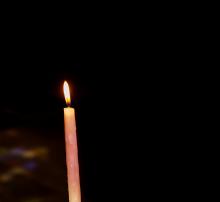
In the wake of the latest escalation of the U.S. “war on terror,” it’s time to remember the origin of Veterans Day. In 1926, Congress officially recognized the commemoration of Armistice Day on Nov. 11 with the exhortation, “the recurring anniversary of this date should be commemorated with thanksgiving and prayer and exercises designed to perpetuate peace through good will and mutual understanding between nations.” Armistice Day commemorated the day when World War I hostilities ceased, and had been celebrated informally since 1919 as a day to work for peace.